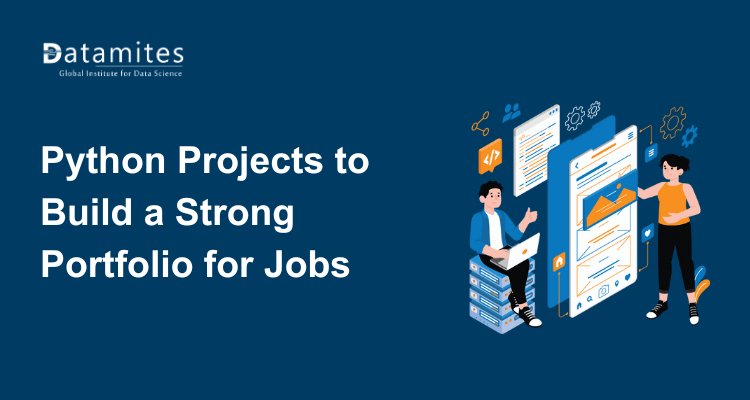Artificial Intelligence Course Eligibility Criteria, Syllabus & Skills
This blog covers the essential eligibility criteria, comprehensive syllabus, and key skills required for pursuing an Artificial Intelligence course. It provides valuable insights for aspiring students looking to build a career in AI.
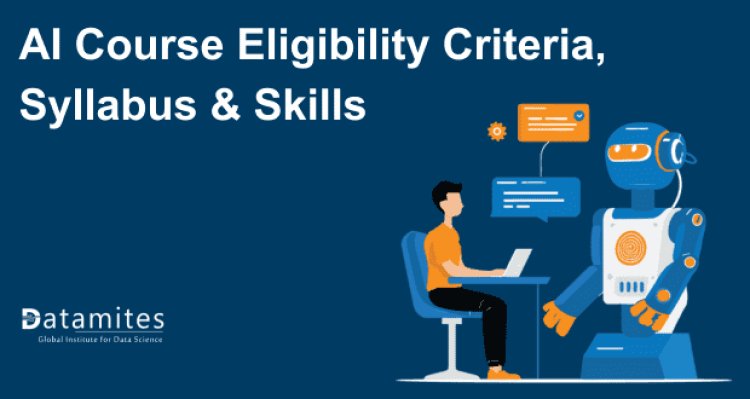
Artificial intelligence (AI) represents a burgeoning opportunity, fueled by an ever-expanding tech ecosystem and a rapidly growing market for intelligent, data-driven solutions. It encompasses the development of systems that can mimic human-like cognitive functions, enabling organizations to automate tasks, make predictive decisions, and drive innovation.
According to research conducted by Allied Market Research, it's projected that the market value of Artificial Intelligence will reach an impressive $1,581.70 billion by the year 2030. This growth trajectory is anticipated to be fueled by a notable compound annual growth rate (CAGR) of 38.0%.
In today's world, AI plays a pivotal role in various industries, empowering organizations to gain a competitive advantage, streamline operations, and deepen their understanding of complex data patterns. The demand for Artificial Intelligence experts and professionals is skyrocketing as businesses recognize the imperative of harnessing AI's transformative potential. In this article, we will delve into its scope, skills eligibility requirements etc.
Understanding the Concept of Artificial Intelligence
Artificial Intelligence (AI) is a transformative technology that simulates human intelligence in machines, enabling them to perform tasks such as problem-solving, learning, and decision-making. Its demand and popularity have skyrocketed in recent years, permeating various industries like healthcare, finance, and transportation.
According to information from the U.S. Bureau of Labor Statistics, careers in the field of artificial intelligence are projected to experience a growth rate of about 21% from 2021 to 2031.
AI's ability to analyze vast datasets, automate processes, and provide valuable insights has led to increased efficiency and innovation. With its potential to revolutionize how we live and work, the demand for AI professionals, developers, and AI-powered solutions continues to grow, making it a critical field in the digital age.
Read These Articles:
- Artificial Intelligence vs Machine Learning
- Artificial Intelligence in Logistics Industries
- Advantages and Disadvantages of Artificial Intelligence
Artificial Intelligence Eligibility Criteria
To pursue a career as an Artificial Intelligence (AI) Engineer, you'll need a solid educational background and specific qualifications. Here are the qualifications and educational prerequisites typically required for this role:
- Educational Qualification: Candidates should have a bachelor's degree in computer science, engineering, mathematics, or a related field. For advanced roles, a master's or doctoral degree may be required.
- Programming Skills: Proficiency in programming languages such as Python, Java, C++, or R is essential for developing AI algorithms and applications.
- Mathematical Aptitude: Strong understanding of mathematical concepts including linear algebra, calculus, probability, and statistics is crucial for designing and implementing AI models.
- Machine Learning and AI Concepts: Familiarity with machine learning algorithms, neural networks, deep learning architectures, natural language processing, computer vision, and other AI techniques is necessary.
- Problem-Solving Skills: Ability to analyze complex problems, devise innovative solutions, and implement them effectively using AI techniques.
- Hands-on Experience: Acquire Hands-on experience by working on AI projects, participating in internships, or engaging in research opportunities.
- Certification: Gain Artificial Intelligence Certifications to demonstrate proficiency in specific AI tools or technologies (e.g., TensorFlow Developer Certificate) may enhance eligibility.
- Advanced Education (Optional but beneficial): Master's Degree: Pursuing a Master's degree in AI, Machine Learning, Data Science, or a closely related field can enhance your qualifications and open up more specialized career opportunities.
Skills to Become Master in Artificial Intelligence
Becoming a master in artificial intelligence (AI) requires a combination of technical skills, and a deep understanding of AI concepts. Here are some key skills you should focus on:
- Programming Languages: Proficiency in programming languages such as Python, R, and Java is essential for AI development.
- Machine Learning: Mastering machine learning algorithms, techniques, and libraries (e.g., scikit-learn, TensorFlow, PyTorch) is crucial for building AI models.
- Deep Learning: Understanding neural networks, deep learning architectures (e.g., CNNs, RNNs, GANs), and frameworks (e.g., TensorFlow, Keras) is essential for tackling complex AI tasks.
- Mathematics and Statistics: Solid understanding of linear algebra, calculus, probability, and statistics is necessary for developing and optimizing AI models.
- Data Preprocessing: Skills in data cleaning, normalization, feature extraction, and dimensionality reduction are important for preparing data for AI modeling.
- Natural Language Processing (NLP): Proficiency in NLP techniques such as sentiment analysis, named entity recognition, and text summarization is valuable for working with textual data.
- Computer Vision: Knowledge of computer vision fundamentals, image processing techniques, and object detection methods is essential for AI applications involving visual data.
- Reinforcement Learning: Understanding reinforcement learning concepts, algorithms (e.g Q-learning, DQN), and environments (e.g OpenAI Gym) is crucial for building AI agents that learn through interaction.
- Big Data Technologies: Familiarity with big data platforms (e.g., Hadoop, Spark) and distributed computing frameworks is important for handling large-scale datasets in AI projects.
- Software Engineering: Skills in software development practices, version control (e.g., Git), and agile methodologies are necessary for building robust and scalable AI systems.
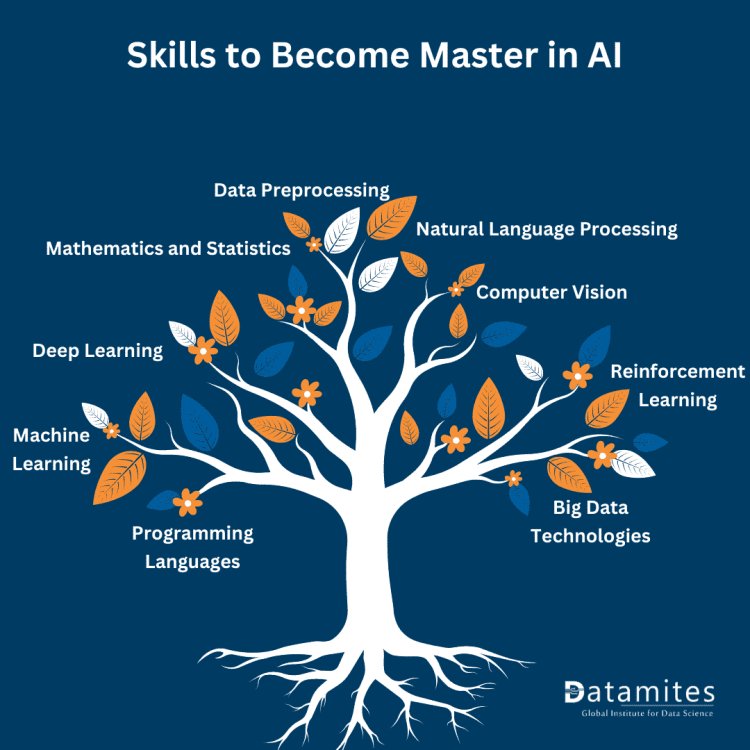
Artificial Intelligence Course Syllabus: An Overview
An Artificial Intelligence (AI) course syllabus typically covers a range of topics essential to understanding and working in the field of AI. Here's a general outline that the course follow:
Introduction to Artificial Intelligence
- Historical overview
- Basic concepts and terminology
- Ethical considerations and societal impacts
Python Programming for AI
- Fundamentals of Python programming language
- Libraries and tools for AI development (e.g., NumPy, Pandas)
Machine Learning Foundations
- Supervised, unsupervised, and reinforcement learning
- Model evaluation and validation techniques
Deep Learning Essentials
- Neural network architectures
- Training strategies and optimization techniques
- TensorFlow and Keras framework introduction
Natural Language Processing (NLP)
- Text preprocessing and tokenization
- Sentiment analysis and text classification
- Named entity recognition and text generation
Computer Vision Fundamentals
- Image processing techniques
- Object detection and image classification
- Convolutional neural networks (CNNs) for vision tasks
Advanced Machine Learning Techniques
- Ensemble learning methods
- Dimensionality reduction techniques (e.g., PCA)
- Hyperparameter tuning and model optimization
AI Applications and Case Studies
- Healthcare: AI in medical diagnosis and patient care
- Finance: Predictive modeling and algorithmic trading
- Autonomous vehicles: Self-driving cars and navigation systems
Capstone Project
- Integration of learned concepts and techniques
- Design and implementation of AI solution for a real-world problem
- Presentation and demonstration of project outcomes
Read These Articles:
- Data Science Career Scope in India
- Python Programming Career Scope in India
- Data Analyst Career Scope in India
Career Paths and Opportunities in the Field of Artificial Intelligence
The field of artificial intelligence (AI) is rapidly evolving and offers a wide range of career paths and opportunities for individuals with different backgrounds and interests. Here are some of the key career paths and opportunities in AI:
Machine Learning Engineer:
- Machine learning engineers are responsible for crafting, constructing, and deploying machine learning algorithms and models.
- Their duties encompass data preprocessing, crafting features, selecting models, and fine-tuning hyperparameters.
Data Scientist:
- Data scientists scrutinize extensive datasets to derive insights and inform decision-making based on data.
- They use statistical techniques and machine learning algorithms to solve complex problems.
AI Research Scientist:
- AI research scientists research to advance the field of AI by developing new algorithms and models.
- Frequently, they operate within academia, research institutions, or the research divisions of technology companies.
Natural Language Processing (NLP) Engineer:
- NLP engineers specialize in the development of algorithms and models for processing and understanding human language.
- They work on applications such as chatbots, sentiment analysis, and language translation.
Computer Vision Engineer:
- Computer vision engineers focus on developing algorithms and models for interpreting and processing visual data.
- They work on tasks like image and video analysis, object detection, and facial recognition.
Robotics Engineer:
- Robotics engineers design and build intelligent robots and autonomous systems.
- They work on areas like autonomous vehicles, industrial automation, and robotics research.
AI Ethics and Fairness Specialist:
- These professionals focus on ensuring that AI systems are developed and deployed ethically and fairly.
- They address issues related to bias, privacy, and transparency in AI systems.
AI Product Manager:
- AI product managers act as intermediaries, connecting technical teams with business stakeholders.
- They define AI product strategies, prioritize features, and oversee product development.
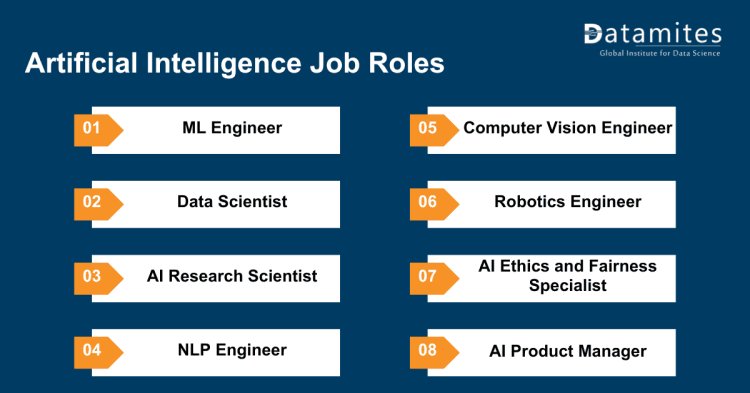
What are the recent Job Market and Salary Trends in Artificial Intelligence?
The job market and salary trends for Artificial Intelligence (AI) show significant growth and demand across various industries. Here are some key highlights:
Job Market Trends
Prevalence of Full-time Roles: The AI industry predominantly offers full-time roles, with a significant portion of jobs requiring mid-level experience. Entry-level positions and those for freshers are relatively scarce.
Growth Across Industries: AI is widely utilized in numerous sectors, including tech sales, insurance, banking, healthcare, and manufacturing, among others. This widespread application indicates a robust job market across different fields.
Impact of AI on Employment: While AI is automating some tasks and could replace certain entry-level jobs, such as basic writing, proofreading, and customer service roles where no direct customer interaction is required, it is also creating new opportunities in more advanced areas.
Read These Articles:
- Artificial Intelligence Course Fee in India
- Artificial Intelligence Course Fee in Pune
- Artificial Intelligence Course Fee in Bangalore
- Artificial Intelligence Course Fee in Chennai
Worldwide Salary Trends:
- The salary of an artificial intelligence engineer in the UK ranges from GBP 60,647 per year according to a Glassdoor report.
- The salary of an artificial intelligence engineer in the USA ranges from USD 1,53,933 per year according to a Glassdoor report.
- The salary of an artificial intelligence engineer in Canada ranges from CAD 1,04,708 per year according to a Glassdoor report.
- The salary of an artificial intelligence engineer in Australia ranges from AUD 1,16,000 per year according to a Glassdoor report.
- The salary of an artificial intelligence engineer in South Africa ranges from ZAR7,62,835 per year according to a Glassdoor report.
- The salary of an artificial intelligence engineer in the UAE ranges from AED 3,47,626 per year according to an Economic Research Institute report.
- The salary of an artificial intelligence engineer in Saudi Arabia ranges from SAR 2,46,031 per year according to an Economic Research Institute report.
- The salary of an artificial intelligence engineer in Switzerland ranges from CHF1,37,537 per year according to an Economic Research Institute report.
- The salary of an artificial intelligence engineer in India ranges from INR 11,60,909 per year according to a Glassdoor report.
- The salary of an artificial intelligence engineer in Germany ranges from EUR 93,247 per year according to an Economic Research Institute report.
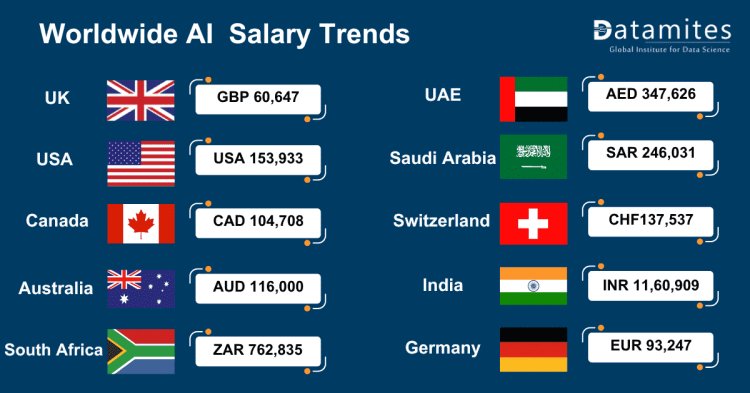
Eligibility for an artificial intelligence course typically requires a background in computer science or related fields, along with proficiency in mathematics and programming languages like Python. Key skills for success in such courses include critical thinking, problem-solving, and a strong understanding of algorithms and data structures. The syllabus often covers topics such as machine learning, neural networks, natural language processing, and ethics in AI, equipping students with the knowledge and skills to thrive in this rapidly evolving field.
DataMites, recognized globally for its commitment to educational excellence for over a decade, has made a significant impact in the field of data science education. This is evidenced by its achievement of educating more than 50,000+ learners across the globe and being ranked among the top 5 data science institutes worldwide in 2022 by IABAC®. The institute offers a broad spectrum of courses, including Python, Deep Learning, Data Science, Machine Learning, MLOps, Tableau, and Data Mining, catering to a wide range of learning needs in the ever-evolving tech landscape.
DataMites Training Institute offers a detailed Artificial Intelligence course, accredited with globally recognized certifications for industry credibility. The program encompasses machine learning, deep learning, and AI tools, featuring hands-on projects and expert mentorship. With flexible learning options, including online and in-person classes, it caters to both beginners and professionals. DataMites equips learners with the skills and certification needed to pursue AI-driven career opportunities.




